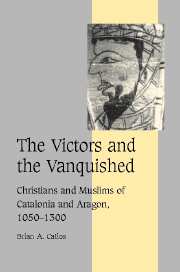Book contents
- Frontmatter
- Contents
- List of figures
- List of maps
- List of tables
- Acknowledgments
- Note on the citation of sources, dates, places, and names
- Glossary
- List of abbreviations
- INTRODUCTION
- Part I Muslim domination of the Ebro and its demise, 700–1200
- Part II Muslims under Christian rule
- Part III INDIVIDUAL AND COMMUNITY IN THE CHRISTIAN EBRO
- INTRODUCTION
- CASE STUDY 1: FISCAL AND CONFESSIONAL IDENTITY: THE GALIPS, TEMPLAR VASSALS IN ZARAGOZA (1179–1390)
- CASE STUDY 2: FRANQUITAS AND FACTIONALISM IN DAROCA: THE LUÇERA FAMILY VS. THE ALJAMA (1267–1302)
- CASE STUDY 3: LITIGATION AND COMPETITION WITHIN THE MUSLIM COMMUNITY: THE ABDELLAS OF DAROCA (1280–1310)
- CASE STUDY 4: ADMINISTRATIVE CORRUPTION AND ROYAL COMPLICITY: ABRAHIM ABENGENTOR, ÇAUALQUEM OF HUESCA (1260–1304)
- CASE STUDY 5: OVERLAPPING AGENDAS: THE CAREER OF MAHOMET, ALAMINUS OF BORJA (1276–1302)
- CASE STUDY 6: THE GOOD, THE BAD, AND THE INDIFFERENT: CHRISTIAN OFFICIALS IN THE EBRO REGION
- PERSONAL HISTORIES: THE INDIVIDUAL, WITHIN THE COMMUNITY AND BEYOND
- Conclusions
- Appendices
- Select bibliography
- Index
- Cambridge Studies in Medieval Life and Thought Fourth series
CASE STUDY 4: ADMINISTRATIVE CORRUPTION AND ROYAL COMPLICITY: ABRAHIM ABENGENTOR, ÇAUALQUEM OF HUESCA (1260–1304)
Published online by Cambridge University Press: 08 January 2010
- Frontmatter
- Contents
- List of figures
- List of maps
- List of tables
- Acknowledgments
- Note on the citation of sources, dates, places, and names
- Glossary
- List of abbreviations
- INTRODUCTION
- Part I Muslim domination of the Ebro and its demise, 700–1200
- Part II Muslims under Christian rule
- Part III INDIVIDUAL AND COMMUNITY IN THE CHRISTIAN EBRO
- INTRODUCTION
- CASE STUDY 1: FISCAL AND CONFESSIONAL IDENTITY: THE GALIPS, TEMPLAR VASSALS IN ZARAGOZA (1179–1390)
- CASE STUDY 2: FRANQUITAS AND FACTIONALISM IN DAROCA: THE LUÇERA FAMILY VS. THE ALJAMA (1267–1302)
- CASE STUDY 3: LITIGATION AND COMPETITION WITHIN THE MUSLIM COMMUNITY: THE ABDELLAS OF DAROCA (1280–1310)
- CASE STUDY 4: ADMINISTRATIVE CORRUPTION AND ROYAL COMPLICITY: ABRAHIM ABENGENTOR, ÇAUALQUEM OF HUESCA (1260–1304)
- CASE STUDY 5: OVERLAPPING AGENDAS: THE CAREER OF MAHOMET, ALAMINUS OF BORJA (1276–1302)
- CASE STUDY 6: THE GOOD, THE BAD, AND THE INDIFFERENT: CHRISTIAN OFFICIALS IN THE EBRO REGION
- PERSONAL HISTORIES: THE INDIVIDUAL, WITHIN THE COMMUNITY AND BEYOND
- Conclusions
- Appendices
- Select bibliography
- Index
- Cambridge Studies in Medieval Life and Thought Fourth series
Summary
Much as the agency of Christian officials may have encouraged an insalubrious administrative atmosphere in the aljamas, the abuse of Islamic law was not necessarily a result of such intervention, as there was no shortage of Muslim officials who were prepared to put their own interests above those of their constituents. The Islamic community of Huesca, for example, had the misfortune to be administered by such an individual throughout the late thirteenth century. The most noteworthy of its çaualquemi, Abrahim Abengentor, hung on to office through more than thirty years of more or less continuous scandal, providing an excellent example of the degree to which Muslim officials were capable of adapting to Christian administrative practices, using them with enviable effectiveness to promote their personal ends.
In 1260 Abrahim received his appointment from Jaume I, succeeding his father, Abdella, and his brother, Abdernele, in the offices of scriptor, alaminus, and çaualquem. The investiture, which gave him a virtual monopoly over the administration of the aljama of Huesca, was for life, and included jurisdiction over not only the town itself but also the surrounding area. Abrahim was to enjoy income from the fees generated by his various offices and, in exchange, was to pay an annual fee of thirty “morabetíns alfonsíns.” He could appoint deputies as he wished, and was not obliged to attend personally to the duties with which he was charged, making the commission resemble a tax-farming concession rather than a quasi-religious administrative post.
- Type
- Chapter
- Information
- The Victors and the VanquishedChristians and Muslims of Catalonia and Aragon, 1050–1300, pp. 357 - 365Publisher: Cambridge University PressPrint publication year: 2004



